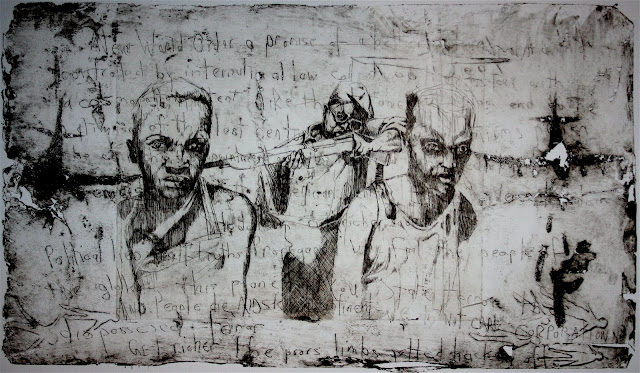The Convergence of the Twain
Thomas Hardy (1912)
(Lines on the loss of the "Titanic" written at the start of the “last” millenium)
In a solitude of the sea
Deep from human vanity, And the Pride of Life that planned her, stilly couches she.
Steel chambers, late the pyres
Of her salamandrine fires, Cold currents thrid, and turn to rhythmic tidal lyres.
Over the mirrors meant
To glass the opulent The sea-worm crawls grotesque, slimed, dumb, indifferent.
Jewels in joy designed
To ravish the sensuous mind Lie lightless, all their sparkles bleared and black and blind.
Dim moon-eyed fishes near
Gaze at the gilded gear And query: "What does this vaingloriousness down here?". . .
Well: while was fashioning
This creature of cleaving wing, The Immanent Will that stirs and urges everything
Prepared a sinister mate
For her so gaily great A Shape of Ice, for the time fat and dissociate.
And as the smart ship grew
In stature, grace, and hue In shadowy silent distance grew the Iceberg too.
Alien they seemed to be:
No mortal eye could see The intimate welding of their later history.
Or sign that they were bent
By paths coincident On being anon twin halves of one August event,
Till the Spinner of the Years
Said "Now!" And each one hears, And consummation comes, and jars two hemispheres.

The 20th anniversary of the fall of the Berlin Wall reminds of the optimism that surrounded 1989. “The end of history” has been used be several commentators as a reference point with which to focus their thoughts at the beginning of the new millennium. So I too will use the arrogance implicit in the statements to fix my ideas. The end of history was the thesis developed by Fukuyama a member one of Washington’s consensus that asserted that the US had won the dialectical struggle with socialism and that democracy had achieved the intellectual utopia Marxists had forecast. The document justified American supremacy following the fall of communism when the unhindered goal of global capitalism seemed assured.
The following etchings however choose to unravel the threads that sought to promote the notion that history was now over. In 1912 Hardy saw the vaingloriousness of the age sunk by nature traveling through the undercurrents of the ocean. As with the Titanic our titanic historical hubris crashed against the reawakening of tribal violence. Without a grand narrative in Europe neighbors turned against each other allowing ancient grievances to re-surface.

The horror of ethnic cleansing was only surpassed by genocide of unspeakable atrocities that swept Africa. Finally, history came banging on the American front door and we found ourselves again waging a war against the most personal of violence, terrorism. History’s end and the poverty of small endless atrocities caused us to withdraw. Self absorption and fascination at our own wounds became the personal narrative that obsessed this new age.

These etchings are about the Millennium and “intimate welding history. The Titanic shook Hardy’s confidence in the power of industrialization. Two years later the globe witnessed the utter failure and naiveté of that world. But no sooner had the war been concluded than Woodrow Wilson claimed that history was over, autocracy vanquished, and the world was now safe for democracy. As he heralded unprecedented American arrogance his vision of the end of history was very pointedly refuted by the red and black apocalyptic vision of George Grosz and those brutally simple lined lithographs that showed the cruelty of man who destroyed lives to preserve a way of life.
 The four etchings are 12x18" and part of a Millennium suite:
The four etchings are 12x18" and part of a Millennium suite:
1 comment:
Interesting post, Paul. I must say I wish I could respond more intelligently. Alas, I'll only suggest that America isn't as arrogant as in years past, at least symbolically: Obama is bowing to every leader he meets.
Post a Comment